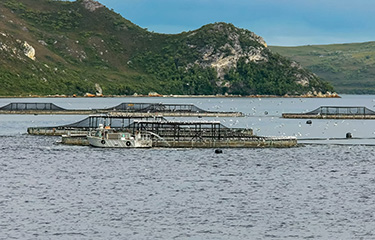Australia Environment Minister Tanya Plibersek has warned she may reconsider salmon-farm licensing in Tasmania to protect a rare fish.
Eenvironmental groups have increasingly called for restrictions on salmon farming in Tasmania after a study by the University of Tasmania said aquaculture operations could be a factor in the decline of the endangered Maugean skate. The skate, which is endemic only to Macquarie Harbor, has seen its population drop by half in the last seven years, with some scientists warning the species could be one extreme weather event from extinction.
The Australia Institute, the Bob Brown Foundation, and the Environmental Defenders Office have requested the government reconsider salmon licensing under the Environment Protection and Biodiversity Conservation Act, citing the plight of the Maugean skate, the Australian Broadcasting Company reported. In light of the study, Plibersek sent a letter to Tasmania Premier Jeremy Rockliff indicating she may have to reconsider salmon-farm licensing in the area.
“If the reconsideration finds that the salmon industry in Macquarie Harbor does not have the necessary environmental approvals, the EPBC Act … would require operations to pause while approvals are sought,” she wrote. “But I will look at any action I can take, consistent with my legal obligations … to support the Tasmanian government regulator, and the salmon farming industry, to put their operations on a truly sustainable footing.”
Rockliff responded by saying he would fight against any form of limitation or shutdown of the salmon industry.
“I want to be clear, I will not stand by and allow the federal Labor government to kill off our salmon industry and the more than 350 jobs that it supports,” Rockliff said. “Our government backs our salmon industry 100 percent. We back the businesses that it supports. We back the jobs that employ Tasmanians and allow Tasmanian mums and dads to put dinner on the table and pay their mortgages."
In August 2023, the Tasmanian salmon industry extended a program funding conservation initiatives to save the Maugean skate. Salmon Tasmania, an organization with members from Tasmania’s salmon industry, said the effort was “one of the largest private industry contributions to a wildlife conservation initiative ever in Tasmania to secure the future of the Maugean skate."
“Salmon has been farmed in Macquarie Harbor for over 30 years and the industry is directly responsible for 17 percent of all jobs on the west coast,” Salmon Tasmania CEO Luke Martin said in a release. “The industry first wrote to the Australian government two years ago urging action on the skate, and we continue to work with the science community and all levels of government around the immediate priorities to secure the species and improve the Macquarie Harbor ecosystem.”
Amid the tensions, a report from The Australia Institute released 11 November claims Tasmania's salmon industry appears to pay almost no taxes. The nonprofit's report found that over the last nine years, the three main salmon-farming companies in Tasmania – Tassal, Huon Aquaculture, and Sealord Australia – paid AUD 51 million (USD 33 million, EUR 30 million) in tax on sales of over AUD 7 billion (USD 4.5 billion, EUR 4.2 billion), an effective tax of 0.7 percent on total income. The Australia Institute claims the apparent tax is just 8.8 percent of the companies’ taxable income, and all three companies paid no tax in the last three years.
“I think most Tasmanians would be shocked to find that they pay more tax in goods and services taxes every time they go to the supermarket than the salmon industry paid in the last three years,” Australia Institute Tasmania Director Eloise Carr said. “The Tasmanian salmon industry never misses an opportunity to promote its economic claims, but one word is rarely mentioned – tax.”
Carr also claimed the industry has known about potential problems with fish farming in Macquarie Harbor for “over a decade."
“The industry is also trying to mislead Tasmanians about the science. The science is clear: salmon operations affect water quality in many coastal habitats and are primarily responsible for severe oxygen depletion in Macquarie Harbor, one-third of which is World Heritage-listed,” Carr said. “It looks likely to cause the extinction of the Gondwana-era Maugean skate – an outstanding universal value of the World Heritage Area. But who is paying for that? Not the companies, apparently.”
Photo courtesy of crbellette/Shutterstock







